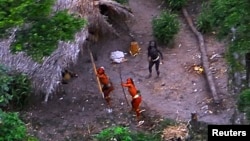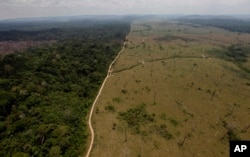Illegal loggers and militias cleared an area three times the size of Gibraltar in Brazil's Amazon this year, threatening an “uncontacted” indigenous tribe, activists said on Tuesday.
Satellite imagery collected by Instituto Socioambiental (ISA), a Brazilian advocacy group, detected about 4,600 acres (1,863 hectares) of deforestation this year in the Ituna Itata indigenous land in northern Para state.
“This situation is very worrying,” Juan Doblas, senior geo-processing analyst at ISA, told the Thomson Reuters Foundation.
“There is a series of risks, not only to indigenous territories of uncontacted tribes, but also to other indigenous territories in the area.”
The indigenous affairs agency Funai and the federal police were not immediately available to comment. The environmental protection agency Ibama said in a statement that official data on Amazon deforestation will be released in November.
Brazil's uncontacted tribes, some of the last on earth, depend on large areas of unspoiled forest land to hunt animals and gather the food they need to survive.
They are particularly vulnerable when their land rights are threatened because they lack the natural immunity to diseases that are carried by outsiders, rights groups say.
Forest loss in Ituna Itata — from which outsiders were banned in 2011 to protect the uncontacted tribe — spiked to about 2,000 acres in August from 7 acres in May, said ISA, which has monitored the area through satellites since January.
South America’s largest country is grappling with scores of deadly land conflicts, illustrating the tensions between preserving indigenous culture and economic development.
ISA filed a complaint in April to federal and state authorities about forest destruction and illegal logging in the area during the rainy season, which is unusual, said Doblas.
“It was a sign that something very serious was going to happen,” he said. “It was a preparation for the invasion.”
The environmental protection agency Ibama responded by sending in patrols in May, which temporarily halted the logging, he said, adding that ISA plans to file another complaint this week, using updated data and satellite images.






